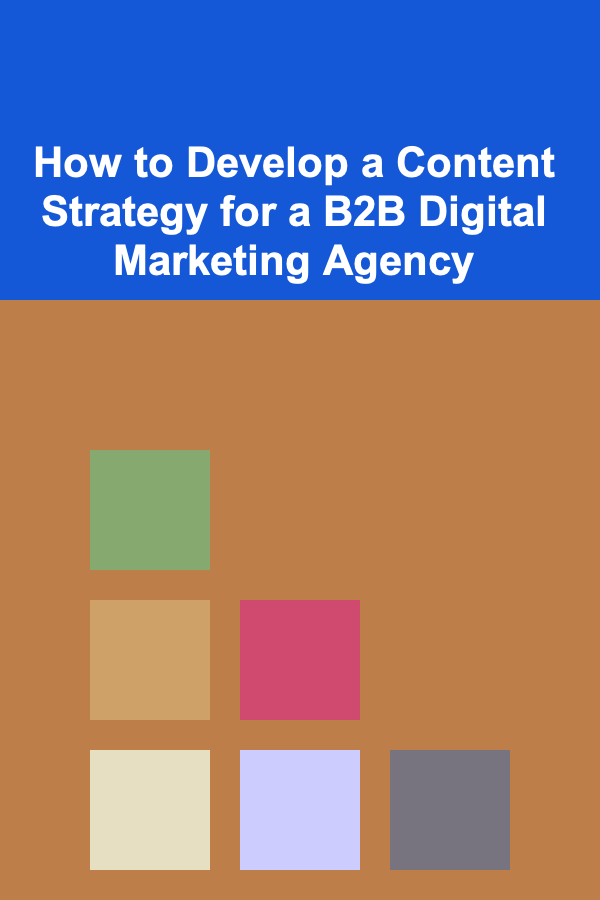
How to Develop a Content Strategy for a B2B Digital Marketing Agency
ebook include PDF & Audio bundle (Micro Guide)
$12.99$7.99
Limited Time Offer! Order within the next:

Developing a content strategy for a B2B (Business-to-Business) digital marketing agency requires careful planning, a deep understanding of the target audience, and the ability to deliver value-driven content. In today's competitive landscape, B2B companies face unique challenges when it comes to digital marketing. Unlike B2C (Business-to-Consumer) marketing, B2B marketing often involves longer sales cycles, complex decision-making processes, and multiple stakeholders.
A solid content strategy for a B2B digital marketing agency must not only highlight the agency's expertise but also demonstrate its ability to solve business problems, foster long-term relationships, and drive measurable results. Below, we will explore how to develop a comprehensive content strategy that helps position your agency as a trusted partner for businesses seeking to improve their digital marketing.
Understand Your Agency's Mission and Goals
Before diving into content creation, you must first understand your agency's mission, vision, and objectives. These elements are the foundation for everything you do, including your content strategy. Your content should always align with your business goals, whether it's brand awareness, lead generation, customer retention, or establishing thought leadership.
Define Key Goals:
- Brand Awareness: If your agency is relatively new or expanding into new markets, your content should focus on increasing brand awareness. Think about high-level topics that introduce your agency's value propositions.
- Lead Generation: If your agency's goal is to generate more qualified leads, your content should target key decision-makers in organizations, emphasizing how your services can solve their pain points.
- Thought Leadership: As a digital marketing agency, positioning yourself as an authority in the field is crucial. Develop content that showcases your expertise, provides valuable insights, and educates your target audience on industry trends.
- Customer Retention: For agencies with existing clients, your content strategy should prioritize customer retention. Use case studies, client success stories, and resource-based content to demonstrate how your agency continuously adds value.
Metrics and KPIs:
To measure the success of your content strategy, define specific metrics and KPIs (Key Performance Indicators). These might include website traffic, blog engagement (comments, shares), conversion rates, lead generation (form submissions, downloads), or customer retention rates.
Understand Your Target Audience
In B2B marketing, understanding your audience is critical. Unlike B2C marketing, where consumer preferences are often driven by emotion and impulse, B2B marketing revolves around logic, data, and ROI (return on investment).
Develop Buyer Personas:
Create detailed buyer personas that reflect your target audience's characteristics. These personas will represent the key decision-makers or influencers you want to target within your prospective client's organization. Here are some considerations when building buyer personas for B2B digital marketing:
- Role: Are you targeting C-level executives, marketing managers, or IT specialists?
- Pain Points: What problems or challenges do they face? How can your agency help solve these issues?
- Goals: What are their professional goals? Do they aim to improve ROI, generate more leads, or improve brand visibility?
- Buying Process: How does this person typically make purchasing decisions? Do they need to consult with multiple stakeholders?
For a digital marketing agency, your target audience may include industries such as eCommerce, SaaS (Software as a Service), or professional services, each of which has its own unique set of challenges.
Create a Content Plan and Calendar
A content plan is an essential tool for staying organized and ensuring your content aligns with your business goals and audience needs. This plan should include the types of content you will create, the topics you will cover, and the frequency of publication.
Content Types to Consider:
- Blog Posts: Blogs are a great way to target both broad and niche keywords. Focus on creating high-quality, SEO-optimized posts that answer specific questions or solve pain points for your audience.
- Case Studies: Case studies are one of the most powerful forms of content in B2B marketing. These detailed stories illustrate how your agency has helped other businesses overcome challenges. They not only demonstrate your expertise but also build trust with your audience.
- Whitepapers and Ebooks: These longer-form resources are ideal for lead generation. Offer them in exchange for a prospect's contact information and use them to build your email list.
- Infographics: Visual content like infographics is often more shareable and easier to digest. They can summarize complex ideas or data-driven insights in a simple, engaging format.
- Videos: Video content is becoming increasingly important in B2B marketing. From product demonstrations to thought leadership videos, this format allows you to showcase your agency's expertise in a more dynamic and engaging way.
- Webinars: Hosting webinars provides an opportunity to directly engage with your audience. You can discuss key industry trends, showcase your knowledge, and answer questions in real time.
- Podcasts: If your agency has access to experts and thought leaders, podcasts are a fantastic way to build authority and connect with a more engaged audience.
- Social Media Posts: While social media is often seen as a B2C channel, it can also be incredibly valuable for B2B marketing. Use platforms like LinkedIn and Twitter to share your content, insights, and industry news.
Content Calendar:
Create a content calendar to map out when and where each piece of content will be published. This will help ensure consistency and allow you to plan your content around key industry events, holidays, or seasonal trends.
A content calendar also helps you maintain a balanced mix of content types and ensures that you don't over-focus on one topic or format at the expense of others.
Develop a Strong SEO Strategy
In the world of digital marketing, visibility is everything. If your content is not optimized for search engines, it may not reach the audience that needs it most. SEO (Search Engine Optimization) is a key component of your content strategy, helping your agency's website, blog posts, and other content rank higher in search engine results.
Key SEO Factors for B2B Content:
- Keyword Research: Use tools like Google Keyword Planner, SEMrush, or Ahrefs to identify the keywords and phrases your target audience is searching for. Consider long-tail keywords that are specific to your niche or industry.
- On-Page SEO: Ensure each page and blog post is optimized for both users and search engines. This includes using target keywords in titles, headings, meta descriptions, and throughout the content. Also, optimize for mobile-friendliness and fast loading speeds.
- Content Optimization: Along with keyword usage, content should be well-structured, engaging, and valuable. The longer the content stays on your website and the more engaged visitors are, the better your SEO performance will be.
- Backlinking: Link to authoritative sources and gain backlinks from reputable websites within your industry. This helps to boost your website's authority and improve search engine rankings.
Leverage Data and Analytics
Data-driven decision-making is crucial in developing and adjusting your content strategy. Use analytics tools like Google Analytics, HubSpot, or SEMrush to track the performance of your content.
Key Metrics to Monitor:
- Traffic: Track how much organic traffic your content is generating. This helps you understand which pieces of content are most successful in attracting visitors.
- Engagement: Monitor how engaged your audience is with your content. Metrics like time spent on page, bounce rate, and social media shares can provide insights into whether your content is resonating with your audience.
- Lead Conversion: The ultimate goal of most B2B content strategies is to generate leads. Track how many visitors are converting into leads or customers as a result of consuming your content.
- Sales: Even further down the funnel, monitor how your content impacts actual sales. You might want to look at how case studies or demos are influencing the buying decisions of your prospects.
Adapt and Evolve Your Content Strategy
Digital marketing is constantly changing. As new tools, platforms, and techniques emerge, it's essential to regularly assess and adjust your content strategy. What works today may not work tomorrow, so be prepared to pivot and adapt your strategy based on performance data, industry trends, and feedback from your target audience.
Conclusion
A well-crafted content strategy is an essential part of any B2B digital marketing agency's success. It requires a deep understanding of your audience, the ability to produce high-quality, valuable content, and a commitment to continuous learning and adaptation. By aligning your content strategy with your agency's business goals, you can establish a strong online presence, attract high-quality leads, and build long-lasting relationships with clients.
Remember, B2B content marketing is not just about creating content for content's sake. It's about creating content that addresses your audience's pain points, educates them, and positions your agency as the go-to solution provider.
Reading More From Our Other Websites
- [Trail Running Tip 101] Finding Mental Clarity on the Trail: How Running Outdoors Clears Your Mind
- [Home Cleaning 101] How to Clean a Bathroom Sink: Tips for a Sparkling Vanity
- [Home Party Planning 101] How to Collaborate with Small Event Organisers for Unique Parties
- [Home Storage Solution 101] How to Keep Your Home Organized by Using Seasonal Storage Rotations
- [Scrapbooking Tip 101] Creative Card-to-Scrap Techniques: Turning Greeting Cards into Memorable Pages
- [Personal Care Tips 101] How to Keep Your Mind Sharp with Brain-Boosting Activities
- [Home Maintenance 101] How to Clean and Maintain Your Home's Windows for Better Efficiency
- [Metal Stamping Tip 101] Why ISO 9001 Is the Foundation for Quality in Metal Stamping
- [Home Cleaning 101] How to Clean a Bathroom: Tips for a Sparkling Space
- [Organization Tip 101] How to Stay Organized During the Last Minute Packing

How to Combine Functionality and Style in Your Renovation
Read More
How to Incorporate Sustainable Lighting Options into Your Home
Read More
How to Make a Recipe Book for Kids to Encourage Cooking
Read More
How to Find Your Spark Again
Read More
10 Tips for International Students: A College Application Checklist
Read More
10 Tips for a Weekly Self-Care Checklist for Moms
Read MoreOther Products

How to Combine Functionality and Style in Your Renovation
Read More
How to Incorporate Sustainable Lighting Options into Your Home
Read More
How to Make a Recipe Book for Kids to Encourage Cooking
Read More
How to Find Your Spark Again
Read More
10 Tips for International Students: A College Application Checklist
Read More